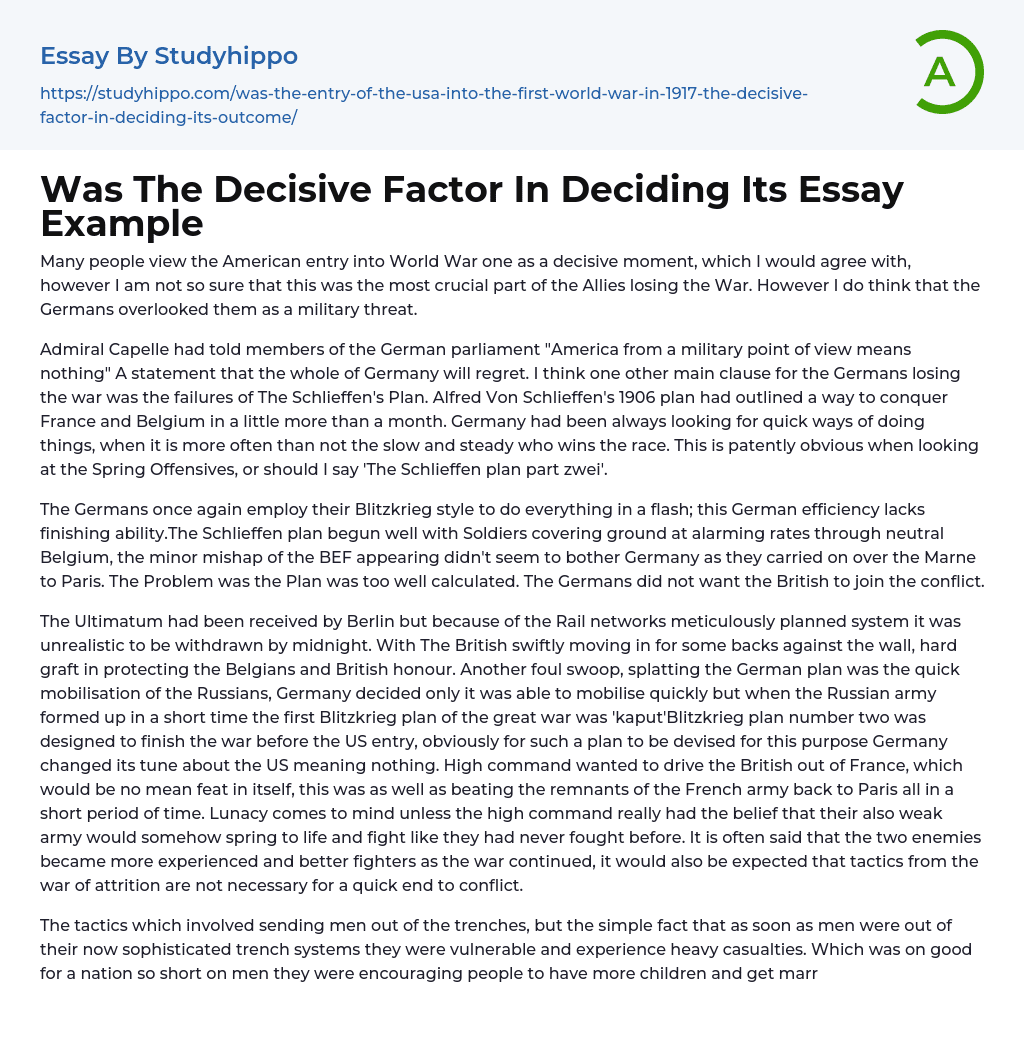While some might consider America's involvement in World War I a critical event, I am not entirely convinced that it was the most significant factor in the Allies' defeat. Nonetheless, I believe that the Germans underestimated the American military's potential.
During an address to the German parliament, Admiral Capelle stated that "America from a military point of view means nothing," a statement that would later prove regrettable for Germany. Along with this, the German loss in the war can also be attributed to the failures of The Schlieffen's Plan - a 1906 strategy for conquering France and Belgium quickly. Germany had always sought swift solutions, despite the fact that slow and steady often wins the race. This was evident in the Spring Offensives, essentially a second attempt at implementing The Schlieffen Plan.
Germany continues to use the
...Blitzkrieg approach, which is known for its speed but lacks follow-through. The Schlieffen plan started successfully as troops advanced quickly through neutral Belgium. The appearance of the BEF was a small setback, but Germany continued to push through to Paris over the Marne. However, the flaw in the plan was that Germany didn't want Britain to become involved in the war, and the plan was too meticulously calculated.
The Ultimatum was received by Berlin but due to the meticulously planned rail network system, it was impossible to withdraw by midnight. With British forces protecting Belgian and British honor, the German plan was thwarted by the swift mobilization of the Russian army. Germany's first Blitzkrieg plan was rendered useless, leading to the development of a second plan aimed at ending the war before US entry. However, high command's objective of
driving the British out of France and pushing the French army back to Paris in a short period of time seemed like lunacy, unless they believed their army could miraculously become better fighters. As the war continued, both sides gained experience in combat, making tactics from the previous war of attrition unnecessary for a quick end to conflict.
The strategy of sending soldiers out of trenches during the Great War resulted in heavy casualties since the soldiers were vulnerable, despite the development of sophisticated trench systems. This was counterproductive for a nation with a shortage of men who were being encouraged to marry earlier and have more children. Using infantry to try and win the war was unfeasible as it meant resorting back to the horrors of the Somme and extending the line, which also meant losing valuable manpower without any guarantee of success.
Germany's naval blockade plan also failed as they underestimated the nautical power of Britain. The British responded by setting up a stronger blockade of Germany and employing the Convoy system to ensure their self-sufficiency. The sinking of Lusitania, which resulted in the death of 128 American civilians, was a consequence of this failed plan.
Queue the US entry. The entry of the United States had varying effects on the different sides. The allies felt relieved and grateful for the trained troops who were ready for any challenge and tackled the war with enthusiasm and confidence. The British soldiers had never been happier to see the Americans, as they boosted morale and signaled an end to the war being near. On the other hand, the Germans were shocked at how quickly another nation could mobilize
like themselves. Despite their superior attitude, they failed to acknowledge that they were not superior to everyone.
In the spring, Ludendorf carried out operation Michael to divide the Allies. Similar to the Schlieffen Plan, the offensive had a successful start with significant gains on the first day. However, some individuals took unnecessary risks to showcase their bravery. In World War I, advances involved an intense bombardment by artillery followed by an infantry push, supported by artillery. The initial successes of the offensive caused the Germans to move away from their artillery protection, which resulted in being cut off from supplies. Their eagerness to attack was because winning was necessary before Uncle Sam's troops joined the war effort. Unfortunately, someone else beat the Germans to it once again. Separating the Allies had become increasingly difficult as they were now fighting as a united force under General Foch instead of two separate countries.
The German advance came to a halt due to their overconfidence and failure to plan ahead. The success-oriented mindset of the Germans made them unprepared for defeat. The Joint Leadership of the Allied forces played a crucial role in the failure of the spring offensives. The countries were no longer divided and worked as a unified force to defeat Germany. The Allies demonstrated their strength by overcoming the previous downfall of Russia and ending the war on two fronts. However, both sides suffered losses as Austria, Germany's previously supportive ally in the east, was no longer able to provide military aid and supplies such as food and ammunition.
- Air Force essays
- Army essays
- Soldiers essays
- Army Values essays
- United States Army essays
- Veteran essays
- Aircraft essays
- Sergeant essays
- Culture essays
- Social Control essays
- Citizenship essays
- Social Justice essays
- Caste System essays
- Social Responsibility essays
- Socialization essays
- Deviance essays
- Modern Society essays
- Popularity essays
- Civil Society essays
- Community essays
- Female essays
- Filipino People essays
- Igbo People essays
- Indigenous Australians essays
- Indigenous Peoples essays
- Minority Group essays
- Social Institution essays
- Men essays
- The nation essays
- Middle Class essays
- Social Norms essays
- Discourse Community essays
- Popular Culture essays
- Car Culture essays
- American Culture essays
- Mormon essays
- Indian Culture essays
- Mexican Culture essays
- Pop Culture essays
- Cultural Differences essays
- Culture Shock essays
- Different Cultures essays
- League Of Nations essays
- Battle Of The Somme essays
- Treaty Of Versailles essays
- Fascism essays
- D-day essays
- Athens essays
- Belgium essays
- Berlin essays




